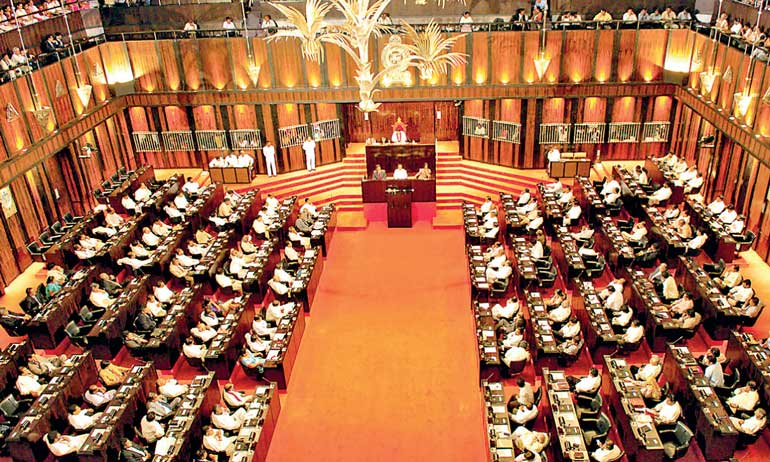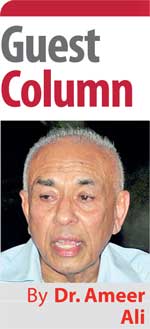Monday Feb 16, 2026
Monday Feb 16, 2026
Friday, 1 November 2024 00:22 - - {{hitsCtrl.values.hits}}

What lessons could the young generation learn from these oldies who with
corrupt governance looted public wealth to create private opulence?
 After reviewing the economy’s performance during the first two years of its stewardship, IMF noted that without reforming governance, economic stability and economic growth would be slow and shaky. Although a noticeable measure of economic stability had been achieved the reviewers noted that growth prospect was still at knife’s edge. But even before IMF stepped into the scene the Aragalaya youth already identified the fundamental sickness that was debilitating the economy for decades and that sickness was bad governance.
After reviewing the economy’s performance during the first two years of its stewardship, IMF noted that without reforming governance, economic stability and economic growth would be slow and shaky. Although a noticeable measure of economic stability had been achieved the reviewers noted that growth prospect was still at knife’s edge. But even before IMF stepped into the scene the Aragalaya youth already identified the fundamental sickness that was debilitating the economy for decades and that sickness was bad governance.
An ethnonational majoritarian political culture with little or no room for meritocracy became the breeding ground for nepotism and corruption. That culture built a socio-economic and political system which in the end bankrupted the national treasury and along with it the national economy. Hence, the dire need for system change.
AKD’s NPP made that promise and undertook to change the political culture through a social revolution if it were given the mandate. AKD’s victory at the Presidential election was the first half of that mandate and the second half is expected to be obtained at the General Election in November. One hopes that the new President will get a supportive parliament with a comfortable majority of representatives from his party.
Reforming governance and expanding economy
The two critical areas in which the new system should make its mark are in reforming governance and expanding the economy. The two are interrelated in the sense that an efficient and corruption-free governance by itself could enable expansion of the economy. For example, corruption promotes illegitimate leakages and therefore reduces the volume of injections in the circular flow which eventually reduces national output and income. Corruption reduces public revenue via tax evasion and loss from State enterprises, which in turn makes national budgeting difficult. The history of Sri Lanka’s ballooning budget deficits a clear illustration of this evil.
It is not a secret that open and subtle forms of corruption in different shapes and magnitudes were not only tolerated as necessary price paid for running frictionless governments made up of conflictual coalitions, but also received social licence from lobbyists and power brokers who enabled such governments to come to power in the first place. It was this diabolic nexus between corruption and governance that crated a poly-crisis, dragged the economy to bankruptcy and compelled RW to invite IMF to take charge of the reparation. The rest is common knowledge.
Against all predictions by our local prophets of gloom IMF did not pack up and run away after AKD was elected as President. Instead, IMF saw in AKD’s determination to reform governance and through that reform change the country’s political culture, a promising opportunity for IMF economic reforms to work effectively and yield a more productive outcome. The Fund’s Managing Director Kristalina Georgieva has therefore committed to continue helping Sri Lanka. On the other hand, pragmatism convinced AKD and his new team that resourcing and expanding the domestic production sector, which they promised to do would be easier with than without IMF reforms. It therefore ended in a marriage of convenience between the two. The budget for 2024-25 by the new Government should reflect the outcome of this marriage; and before that details of the formalised agreement with official and private creditors should provide an indication.
Expansion of economy requires more than IMF assistance
 However, expansion of the economy requires more than IMF assistance. In fact, IMF itself has admitted that globalisation has not delivered for everyone and warned in its latest report on World Economy Outlook, titled “Policy Pivot, Rising Threats” about negative spillovers resulting from policy shifts following elections this year in countries which cover almost 50% of world population. These shifts may point towards a more inward-looking strategy because of rising inequity of wealth and income created by the one-size-fits-all open market paradigm. IMF should admit that there is a crisis in the world economic system driven by capitalism, and that system needs change.
However, expansion of the economy requires more than IMF assistance. In fact, IMF itself has admitted that globalisation has not delivered for everyone and warned in its latest report on World Economy Outlook, titled “Policy Pivot, Rising Threats” about negative spillovers resulting from policy shifts following elections this year in countries which cover almost 50% of world population. These shifts may point towards a more inward-looking strategy because of rising inequity of wealth and income created by the one-size-fits-all open market paradigm. IMF should admit that there is a crisis in the world economic system driven by capitalism, and that system needs change.
Just imagine what would happen to export oriented economies if Donald Trump were to win the US election and translate his Make America Great Again (MAGA) slogan into a mercantilist America First policy. Even if the Democrats were to win the systemic crisis is not going to disappear. Financialisation or the bankers’ takeover of economies, centralising hierarchy obstructing the flow of information, increasing militarisation, ideological undermining of science, disincentivising of innovation, technological conservatism and the end of the hydrocarbon age and energy transition out of cheap fossil fuels are some of the reasons underlying this crisis. There is no use of IMF still preaching that trade should be the engine of global growth when that trade has never been fair towards the developing world.
This is why small economies like Sri Lanka need to fine tune their open economy strategy to give greater weightage to food security and greater self-sufficiency at least to satisfy basic needs. This does not mean going back to a close economy as critiques would argue. External trade and foreign direct investment are essential to boost a small economy’s growth, but that trade should be fair and FDI must create strong linkages with domestic sectors. And the resulting growth should not be at the expense of greater equity. IMF cannot simply ignore these concerns of home governments when it undertakes the task of economic reparation.
Former President RW simply invited the IMF out of desperation and vowed to accept all its conditionalities. NPP’s economic strategy points towards minimising the negative spill overs from systemic crisis originating from corporate capitalism abroad and hence its mixed strategy of openness with greater emphasis on resourcing and protecting the domestic real sector. NPP’s economic strategy is therefore the other half of systemic change.
These developments obviously are generating panic waves within the political camps of the old order. Otherwise, why should RW and MR who initially announced retirement from politics after AKD’s victory, again enter the campaign arena? RW is now asking voters to elect experienced parliamentarians to save the nation and the economy. What experience is he referring to from a generation of leaders who wantonly mismanaged the economy, bankrupted the Treasury and destroyed the ethos of communal harmony by widening ethno-religious cleavages? What lessons could the young generation learn from these oldies who with corrupt governance looted public wealth to create private opulence?
Let the new system therefore start on a clean slate with as many new faces as possible from both genders who would be not only talented in different fields of knowledge but also have a more inclusive vision to build a united Sri Lanka based on democracy, meritocracy and justice. If they fail, then they and they alone should be held responsible for that failure. Hence, the need for a supportive parliament after the election. The Aragalaya awakening cannot come to an end until the new system is completed and put into operation.
(The writer is attached to Business School, Murdoch University, W. Australia.)